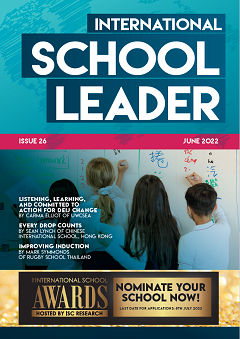By Mark Beales and Siobhan Mellor
As someone who has completed online degrees in the past, I know that one of the key elements to a successful course is the interaction with others. As an international school teacher, online learning can, if delivered well, offer a welcome chance to talk with teachers working in domestic and overseas contexts about a huge range of common educational issues. It also gives you the chance to put learning into practice alongside another school in another part of the world. Understanding different contexts and perspectives can be especially valuable, and is something that I always find inspiring.
NPQH online
The National Professional Qualification in Headship (NPQH) online training, delivered by Real Training provided such an opportunity for me. The accessibility of the course was essential at a time when travel and school-based leadership responsibilities restricted many face-to-face options for me. But of most value was the practical element that this online learning allowed. This provided me with the chance to learn from the facilitator, put elements of that learning into practice in my own leadership, develop wider experiences by collaborating with other school leaders in different school contexts, and then return to the online classroom for further development; a cycle of learning that was repeated and built upon throughout the course.
Drawing upon the online training and discussions, I used an action research approach within my school and also with another school to create many valuable professional development experiences. One of my projects was to support the Vietnam Finland International School (VFIS) in Ho Chi Minh City, Vietnam, with its IB Diploma candidacy. This provided me with many leadership learning opportunities.
Initially, I met with their school leaders and established their current needs. Being a candidate school for the IB is exciting as there is a blank canvas to work from, but it is also challenging as there are numerous requirements to ensure each IB school meets specific standards. A large part of the NPQH deals with effective administration, so my discussions with VFIS included talks about recruitment strategies, marketing and resources.
Developing strong relationships between schools is something I personally believe in, and it’s also something that the NPQH encourages through its ‘Working in Partnerships’ unit. Such relationships developed regularly through the online forums, where experienced and aspiring heads shared experiences and offered advice. It also happened face-to-face, as I organised reciprocal training days between my school, the Australian International School (AIS) and VFIS. This was mutually beneficial as the candidate school’s teachers were highly qualified but had limited IB experience, and my own school’s teachers were interested in the candidate school as it was based on the renowned Finnish model. Another key relationship during my studies was with my current Principal. By spending time with her, I was able to understand the key, and unique, aspects of her role and for that I was particularly grateful.
Since completing my NPQH, the candidate school has now started teaching the IB Diploma and we remain in contact, a sign of the ongoing and effective relationships that the NPQH promotes.
Learning to look at myself
In addition to this project, I also undertook research in my own school. Before this took place, I completed an online survey as part of the NPQH that looked at my own characteristics as a leader. Following this, I had an online conversation with an experienced Head that enabled me to reflect on the survey’s findings. This was especially insightful and valuable and, as a direct result, I decided to develop another project in my own school.
This was aimed at improving the quality of formative feedback for our EAL department. When looking at any change project, it is not only crucial to establish the current situation but also to communicate this to all stakeholders. The NPQH’s focus on building strong communication skills – and being able to adapt them depending on each situation – was especially useful here. After presenting the plan to my school’s SLT, EAL leaders and EAL teachers, the project began. The focus here was on creating strategies to ensure students actively referred to their feedback, rather than filing it away and forgetting about it. I held regular meetings with EAL teachers and soon saw clear progress and a willingness to embrace and retain this method.
Being able to bring about these kind of change projects and also understand the wider aspects of school leadership were the main benefits of my NPQH. The online nature of the course enabled me to connect with and understand a wider range of school contexts than I would normally be able to, and the advice and support I gained during this time was invaluable.
Advice for leadership learning online by Dr Siobhan Mellor
- There is a wide body of research on the key ingredients of effective teacher professional development (TPD) and a growing body of research on how to create effective online TPD. The importance of action research is crucial, as Mark has highlighted, in transforming learning theory into practice-led learning. For this reason, action research is at the heart of the pedagogy of courses designed by Real Training.
- Working in partnership exists at many levels throughout online TPD. Our pedagogy incorporates the critical concept of ‘social presence’ for education professionals when working online. Supportive relationships online are built on peer support from global networks of teachers, individual coaching sessions, synchronous and asynchronous discussions and in-school activities. The partnerships developed ensure the online experience feels collaborative and supportive.
- Online courses are not all the same – the pedagogy underpinning the course design has the ability to transform the learning experience. Not all courses are created equally so consider the model underpinning the learning design when choosing online TPD.
- In addition to the well-researched concepts of social presence, tutor presence and cognitive presence, there is an increasing level of research interest into the factors that underpin ‘learner presence’. The impressive levels of commitment, motivation and tenacity that Mark has outlined suggest that the ‘psychological capital’ of the teacher undertaking online TPD has a role to play in the process of effective learning and successful course completion. The interaction of all these factors in online TPD continues to provide a fascinating arena for further research on the factors underpinning effective online TPD.

Mark Beales is Head of Senior School and Strategic Projects at the Australian International School Vietnam. Connect with him on LinkedIn.

Dr Siobhan Mellor is Director of Real Group Ltd and supports the development and delivery of online courses for teachers and leaders specialising in special educational needs and disabilities. Connect with her on LinkedIn.
Subscribe to International School Leader Magazine for more!


